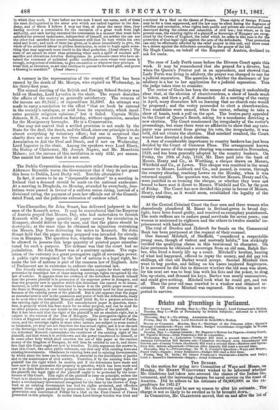Vice-Chancellor, Sir John Stuart, has delivered judgment in , the case
of the Kossuth notes. It may be remembered that the Emperor of Austria prayed that Messrs. Day, who had undertaken to furnish Kossuth with a large quantity of paper money for circulation in Hungary, should deliver up the same, and that the plates should be destroyed; at the same time he obtained an injunction restraining the Messrs. Day from delivering the notes to Kossuth. Sir John Stuart held that the paper money prepared was intended for circula- tion in Hungary. The question was, whether the Messrs. Day could be allowed to possess this large quantity of printed paper manufac- tured for such a purpose. The defence was that the court had no jurisdiction. Sir John Stuart was of a contrary opinion. The regu- lation of the currency is a great prerogative right of sovereign power. A public right recognized by the law of nations is a legal right, be- cause the law of nations is part of the common law of England. Acts of Parliament are in existence to enforce the universal law.
The friendly relations between civilized countries require for their safety the protection by municipal law of those existing sovereign rights recognized by the law of nations. It appears from the evidence of the defendant Kossuth himself that the present plaintiff is in possession of the supreme power in Hungary, and that the property now in question which this defendant has caused to be manu- factured, in order at some future time to issue it as the public paper money of the State in Hungary, is not intended to be immediately used for that purpose, because of the existing power of the plaintiff. But it also appears that the paper so manufactured is now in the possession and power of both the defendants, ready to be used when the defendant Kossuth shall think fit, for a purpose adverse to the existing right of the plaintiff. The manufactured paper in question, there- fore, is property which has been made for no other purpose, and can be used for no other purpose, except one hostile to the sovereign rights of the plaintiff. . . . But it has been said that the right of the plaintiff is not an absolute right, but is subject to the consent of the Diet of Hungary. The prerogative rights of the Crown of England are all directly or indirectly subject to the control of Parlia- ment, and the sovereign rights in most other nations are subject to some control or limitation, yet they are not therefore the less actual rights, and it is at the suit of the Sovereign that they are to be protected by the law. Then it is said that the defendant Kossuth contemplates the overthrow of the existing right of the plaintiff; and that when it is overthrown and the power transferred to himself, or to some other body which shall sanction the use of this paper as the current money of the kingdom of Hungary, he will then be entitled to use it, and there- fore that this Court ought not now to interfere. To this argument the answer is, that this Court, like other public tribunals, can deal only with existing laws and existing Governments. Obedience to existing laws and to existing Governments, by which alone the laws can be enforced, is essential to the distribution of justice and to the maintenance of civil society. Therefore, if by the existing laws the plaintiff has the right which he asserts, and if the defendants have made and have now in their possession the property in question, which has been made and now is in their bands for no other purpose than one hostile to the legal rights of the plaintiff, the legal right of the plaintiff ought to be protected by the inter- ference of this Court. This right of the plaintiff is clear on principle, unless the Court is to abandon its protective jurisdiction Even the sovereignpower, under a revolutionary Government recognized for the time by the Crown of Eng- land as an existing Government has had its rights protected, and offenders against those rights punished .b prosecution in the courts of England. The prosecution and conviction of Peltier for a libel on the First Consul of France proceeded on this principle. In earlier times Lord George Gordon was tried and convicted for a libel on the Queen of France. These rights of foreign Princes may be for a time suppressed, and the law may be silent during the flagrance of rebellion and revolution, when rights both public and private are overturned and destroyed during the crimes and calamities of civil war ; but where, as in the present case, the existing rights of a plaintiff as Sovereign of Hungary are recog- nized by the Crown of England, the relief which he seeks in this case is for the protection of that legal right against the acts of the defendants. That protection can only be effectually afforded by the relief prayed in this suit, and there must be a decree against the defendants according to the prayer of the bill.
Sir Hugh Cairns, on behalf of the Emperor of Austria, declined to. ask for costs.






























 Previous page
Previous page